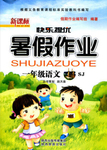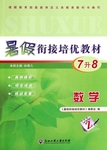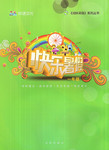
It was lack of money, not of effort, _____ defeated their plan.
A. which B. as
C. that D. what
 新课标快乐提优暑假作业陕西旅游出版社系列答案
新课标快乐提优暑假作业陕西旅游出版社系列答案 暑假衔接培优教材浙江工商大学出版社系列答案
暑假衔接培优教材浙江工商大学出版社系列答案 欣语文化快乐暑假沈阳出版社系列答案
欣语文化快乐暑假沈阳出版社系列答案科目:高中英语 来源:2011-2012学年广东雷州一中徐闻中学高一下学期第二次联考英语试卷(带解析) 题型:阅读理解
Can you understand the beginning of this article?
“My smmr hols wr CWOT. B4, we usd 2go2 NY 2C my bro, his GF & 3 kds FTF.”
The Scottish teacher who received it in class had no idea what the girl who wrote it meant. The essay was written in a form of English used in cell phone text messages. Text messages (also called SMS2) through cell phones became very popular in the late 1990s. At first, mobile phone companies thought that text messaging would be a good way to send messages to customers, but customers quickly began to use the text messaging service to send messages to each other. Teenagers in particular enjoyed using text messaging, and they began to create a new language for messages called texting.
A text message is limited to 160 characters, including letters, spaces, and numbers, so messages must be kept short. In addition, typing on the small keypad of a cell phone is difficult, so it’s common to make words shorter. In texting, a single letter or number can represent a word, like “r” for “are,” “u” for “you,” and “2” for “to.” Several letters can also represent a phrase, like “lol” for “laughing out loud.” Another characteristic of texting is the leaving out of letters in a word, like spelling “please” as “pls.”
Some parents and teachers worry that texting will make children bad spellers and bad writers. The student who wrote the essay at the top of this page said writing that way was more comfortable for her. (The essay said, “My summer holidays were a complete waste of time. Before, we used to go to New York to see my brother, his girlfriend, and their three kids face to face.”)
Not everyone agrees that texting is a bad thing. Some experts say languages always evolve, and this is just another way for English to change. Other people believe texting will disappear soon. New technology for voice messages may soon make text messages a thing of the past.
【小题1】What is the writer’s opinion of text messaging?
| A.It is fun and easy to do. |
| B.It is not bad for children. |
| C.It will make children bad writers. |
| D.The writer does not give an opinion. |
| A.Using phrases to represent essays |
| B.Using numbers to represent words |
| C.Using letters to represent phrases |
| D.Using letters to represent words |
| A.My Gr8 Tchr | B.CU in LA | C.My GF | D.My Smmr Hols |
| A.It has been replaced by voice message |
| B.It’s too difficult to type. |
| C.Teenagers won’t learn to write correctly. |
| D.It’s not comfortable. |
| A.Not many people use texting. |
| B.Spelling in English is too difficult. |
| C.Teenagers quickly become bored with texting. |
| D.Texting will disappear because of new technology. |
查看答案和解析>>
科目:高中英语 来源:2010—2011年广东省梅州市曾宪梓中学高二下期末考试英语试卷 题型:阅读理解
Can you understand the beginning of this essay?
“My smmr hols wr CWOTT. B4, we usd 2go2 NY 2C my bro, his GF & 3 kds FTF.”
The Scottish teacher who received it in class had no idea what the girl who wrote it meant. The essay was written in a form of English used in cell phone text messages. Text messages (also called SMS2) through cell phones became very popular in the late 1990s. At first, mobile phone companies thought that text messaging would be a good way to send messages to customers, but customers quickly began to use the text messaging service to send messages to each other. Teenagers in particular enjoyed using text messaging, and they began to create a new language for messages called texting.
A text message is limited to 160 characters, including letters, spaces, and numbers , so messages must be kept short. In addition, typing on the small keypad of a cell phone is difficult, so it’s common to make words shorter. In texting, a single letter or number can represent a word, like “r” for “are,”“u” for “you,” and “2” for “to.” Several letters can also represent a phrase, like “lol” for “laughing out loud.” Another characteristic of texting is the lea
, so messages must be kept short. In addition, typing on the small keypad of a cell phone is difficult, so it’s common to make words shorter. In texting, a single letter or number can represent a word, like “r” for “are,”“u” for “you,” and “2” for “to.” Several letters can also represent a phrase, like “lol” for “laughing out loud.” Another characteristic of texting is the lea ving out of letters in a word, like spelling “please” as “pls.”
ving out of letters in a word, like spelling “please” as “pls.”
Some parents and teachers worry that texting will make children bad spellers and bad writers. The student who wrote the essay at the top of this page said writing that way was more comfortable for her. (The essay said, “My summer holidays were a complete waste of time. Before, we used to go to New York to see my brother, his girlfriend, and their three kids face to face.”)
Not everyone agrees that texting is a bad thing. Some experts say languages always evolve, and this is just another way for English to change. Other people believe texting will disappear soon. New technology for voice messages may soon make text messages a thing of the past.
【小题1】What is the writer’s opinion of text messaging?
| A.It is fun and easy to do. |
| B.It is not bad for children. |
| C.It will make children bad writers. |
| D.The writer does not give an opinion. |
| A.Using phrases to represent essays |
| B.Using numbers to represent words |
| C.Using letters to represent phrases |
| D.Using letters to represent words |
| A.My Gr8 Tchr | B.CU in LA | C.My GF | D.My Smmr Hols |
| A.It costs too much. | B.It’s too difficult to type. |
| C.Children won’t learn to write correctly. | D.It’s not comfortable. |
| A.Not many people use texting. |
| B.Spelling in English is too difficult. |
| C.Children quickly become bored with texting. |
| D.Texting will disappear because of new technology. |
查看答案和解析>>
科目:高中英语 来源:2015届湖北省高二上学期期中考试英语试卷(解析版) 题型:完型填空
Carly Zalenski’s eyes were filled with tears as the dusty bus ran down a dirt road in southern Vietnam. She and her parents had travelled to Ho Chi Minh City by plane from Canton, Ohio of the USA. As they became to the village, hundreds of cheering stood in lines at the to the Hoa Lac School, a two-story building that Carly had money for.
Carly started helping when she was eight. She often walked about to send Thanksgiving baskets at church to families in need. When she saw one girl very little in a snowy day and others didn’t have warm , she went door-to-door asking for coats, hats, gloves, and scarves, then handed them to the poor families with the baskets.
However, Carly wanted to do more—she wanted to “change these children’s with her efforts”. She remembered that her grandmother’s Rotary club had collected money to build a in Vietnam a few years ago. She wanted to build a school, .
She put together a short show on the people and culture of Vietnam to his audience. her new braces(脚支架) made it to make the speech, she was full of enthusiasm, “I want to give them a place to their lives better.”
That summer, Carly with her family across Ohio, visiting three or four Rotary clubs a week. “We travelled like people to all these meetings,” said her mother. In two years, Carly had raised $50,000. At the donation in Hoa Lac, the school principal was deeply by the little girl. “How wonderful it is,” he said, “that a girl at her age wants to do something for kids so far away.”
1.A. farther B. closer C. higher D. faster
2.A. adults B. farmers C. workers D. children
3.A. entrance B. centre C. top D. exit
4.A. collected B. borrow C. saved D. earned
5.A. another B. the others C. others D. the other
6.A. wearing B. putting on C. dressing D. taking off
7.A. houses B. beds C. clothes D. food
8.A. new B. beautiful C. used D. broken
9.A. out B. up C. back D. over
10.A. anything B. something C. everything D. nothing
11.A. moods B. works C. studies D. lives
12.A. church B. village C. library D. school
13.A. either B. also C. too D. neither
14.A. Because B. Unless C. Although D. When
15.A. hard B. funny C. easy D. happy
16.A. remain B. make C. turn D. allow
17.A. set off B. take off C. turn off D. pay off
18.A. sick B. disabled C. crazy D. friendly
19.A. ceremony B. tradition C. currency D. condition
20.A. surprised B. pleased C. excited D. touched
查看答案和解析>>
科目:高中英语 来源:2013-2014学年四川省成都市毕业班第一次诊断性检测英语试卷(解析版) 题型:其他题
阅读下面短文并回答问题,然后将答案写到答题卡相应的位置上(请注意每题词数要求)。
In the spring of 2013, Carly Zalenski's eyes were filled with tears as the dusty bus ran down a dirt road in southern Vietnam. The 14-year-old girl and her family had traveled by plane from Canton, Ohio, to Ho Chi Minh City and then by bus deep into the Mekong Delta. Now, as they approached the village, hundreds of cheering schoolchildren lined the entrance to the Hoa Lac School, a two-story concrete building that Carly had raised money for.
Carly started helping others when she was eight, handing out Thanksgiving baskets at church to families in need. It was a snowy day, and she saw that one girl was wearing a pair of broken shoes and others didn't have warm coats. The next November, she went door-to-door asking for used coats, hats, gloves, and scarves, and then handed them out with the baskets.
But Carly wanted to do more - she wanted to "change lives," she says. She remembered that her grandmother's Rotary club had, years earlier, raised money to build a school in Vietnam. That was it, she decided. She'd build a school, too.
She put together a PowerPoint presentation on the people and culture of Vietnam. At 12, hardly able to see over the platform, she gave her first fund-raising speech. She spoke with enthusiasm" The kids in rural Vietnam don't have good schools, " she told a room of 200 Rotarians. "That's not fair. I want to raise money and improve the school condition to make their lives better. "
In two years, Carly set off with her family across Ohio, visiting three or four Rotary clubs a week. "We traveled like crazy people to all these meetings," recalled her mother, Kris.
Finally, Carly raised $ 50,000, which was matched by the Vietnam Children's Fund. At the donation ceremony in Hoa Lac, the school principal was impressed with the ninth grader. "How wonderful," he said through a translator, "that a girl wanted to do something for kids of her age so far away. "
1.In which year was Carly born? (Within 2 words)
________________________________________________
2.Why did Carly once collect used clothes from door to door? (Within 12 words)
________________________________________________
3.What made Carly determine to build a school in Vietnam? (Within 10 words)
________________________________________________
4.How did Carly help the kids in rural Vietnam when she was 12? (Within 5 words)
________________________________________________
5.What does the school principal in Hoa Lac think of Carly? (Within 6 words)
________________________________________________
查看答案和解析>>
科目:高中英语 来源: 题型:阅读理解
Carly Zalenski's eyes filled with tears as the dusty bus ran down a dirt road in southern Vietnam. The 14-year-old and her family had traveled by plane from Canton, Ohio. Now, as they approached the village, hundreds of cheering schoolchildren lined the entrance to the Hoa Lac School, a two-story concrete building that Carly had raised money for.
Carly started helping others at eight, handing out Thanksgiving baskets at church to families in need. It was a snowy day, and she saw many girls didn't have warm coats. The next November, she went door to door asking for used coats, hats, gloves and scarves, and then handed them out with the baskets.
But Carly wanted to do more. She remembered her grandmother's Rotarv Club (“扶轮国际”分社) had, years earlier, raised money to build a school in Vietnam. That was what she now wanted to do.
At 12, she began to raise money for Vietnamese children with a PowerPoint presentation. "The kids in rural Vietnam don't have decent schools. I want to give them a place to make their lives better," she told a room of 200 Rotarians.
That summer, Carly set off with her family across Ohio, visiting three or four Rotarv Clubs a week. "We traveled like crazy people to all these meetings," recalls her mother, Kris.
At first they got no donations. But one night, Carly and her dad, Fred, pulled up to a building in Minerva, Ohio. Carrying a laptop, a projector(幻灯机)and a screen, they walked into a bar where 15 people were sitting around a long table. There was dead silence after Carly finished her presentation. Fred thought that was never going to work. Then someone made a motion: "Let's give this girl check right now." Minutes later, Carly walked out with her first donation: $500.
Not everyone was wild about the idea of helping Vietnam. "Why should we help it?" asked one veteran (老兵). Carly replied simply, "They're kids. And I'm just a kid who wants to help out."
As word spread, individual donors sent checks for as little as $5. A restaurant chain contributed $1,000. Carly’s coach organized a tournament that netted $4,000. A bible camp bought 500 backpacks for the children. In two years, Carly raised $50,000.
51. Why did Carly once collect used clothes from door to door?
A. To donate them to a charity.
B. To help Vietnamese children.
C. To raise money for a Rotary Club.
D. To give them to people in need.
52. What made Carly think of building a school in Vietnam?
A. Her grandmother donated money to Rotary Clubs.
B. Her grandmother once built a school in Vietnam.
C. A charity had raised money to build a school in Vietnam.
D. Vietnamese children wrote to her asking for help.
53. The underlined word “wild” in the last but one paragraph probably means “_____”.
A. enthusiastic B. patient C. careful D. anxious
查看答案和解析>>
湖北省互联网违法和不良信息举报平台 | 网上有害信息举报专区 | 电信诈骗举报专区 | 涉历史虚无主义有害信息举报专区 | 涉企侵权举报专区
违法和不良信息举报电话:027-86699610 举报邮箱:58377363@163.com